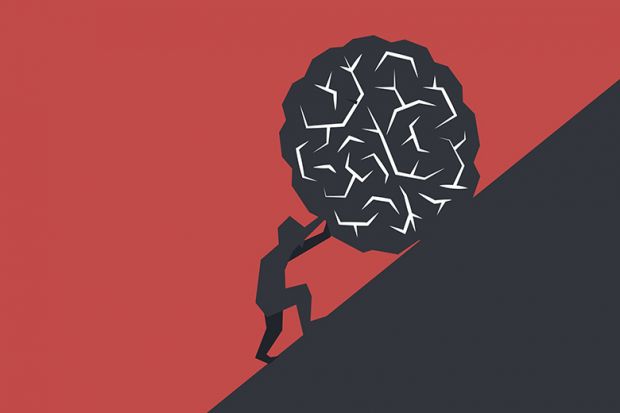“I feel like college puts us to sleep,” says the high-achieving student sitting across from me. It’s pre-Covid times, so I’m still meeting with students in my office. He claims to have stopped by for no particular reason, but I know better than that. Clearly, he has something to get off his chest, so I invite him to continue.
Leaning forward, he takes a deep breath and says: “Well, it’s like we’re running some kind of gauntlet, course after course, semester after semester, one year to the next, working hard, but our real selves are asleep. ‘Get good grades, good internships. Do lots of activities. Build an impressive résumé.’ That’s all we hear. We’re so busy proving ourselves that there’s no time to breathe, let alone think or reflect, and the stuff we have to do for classes mostly feels meaningless – to me, anyway. So we just go to sleep to get through it and hope it’s all worth it when the grind is over.”
Over the years, I’ve heard similar complaints many times, from students across all majors and at every level of achievement.
Academics’ standard response is to invoke the concept of rigour. We assume that busy students stay focused, that learning requires discipline and sacrifice, and that hard work is the key to success – which is all that really matters in the end. This is how the world works, we explain, and students must get accustomed it. In the end, they will be better for it.
Top-down, arduous and motivated extrinsically, this rigour of high expectations, as we might call it, relates to a process of knowledge delivery that relies on lectures, textbooks, homework, quizzes and testing. Since it is relatively easy to implement and assess, especially in a competitive, market-driven culture, it has overwhelmingly become the rigour of choice in American education.
First-year students arrive well schooled in the rigour of high expectations, having been taught that the reason to work hard and get good grades is not the intrinsic value of learning and personal growth, but rather the necessity of earning high test scores, impressing teachers and guidance counsellors, and gathering the right extracurricular activities to stand out to college admissions committees.
The drill is reinforced in college, where students are encouraged to work hard so that in a few years they can impress graduate and professional school admissions committees and prospective employers. The lesson has become indelible by the time they graduate, and they spend their adult lives pursuing jobs, promotions, pay rises, credentials and accolades until they end up just like us: noses to the grindstone, asleep at the wheel.
The student in my office can sense this happening to him. He is torn, and yet he persists. He has friends who feel enormous pressure to perform well and, as a result, have suffered from stress, anxiety and depression. They have resorted to Adderall to boost performance and have sought relief through alcohol and other substances and risky behaviours. In addition, this student has done research into the harmful effects of stress and anxiety on cognition and learning, and he wonders why his professors don’t take these factors into account in their teaching.
The rigour of high expectations makes it a matter of pride to be a “hard”, demanding teacher – even if that is only adding to the aggregate hardness of the world. But my student wonders out loud why learning in college must be a forced march and not a playful adventure – and I silently wonder the same about the process of tenure and promotion.
The stakes are high, and he can see that. We are handing this generation of students the most enormous set of problems any generation has ever faced. But we are failing to deliver the kind of rigorous education they will need to solve them.
High expectations aren’t the only meaning of rigour. The concept can be better understood – more productively, as well as more humanely – as a thorough intellectual exploration of new information, concepts and ideas, with equitable consideration of multiple and even opposing perspectives. This rigour of deep learning appeals to intrinsic motivation, embracing enquiry, analysis, synthesis, application, practice and reflection.
In looking hopefully towards a post-Covid future, it might help to see that the embrace of this kind of rigour does not require new buildings, endowments, faculty or staff. It just requires the bravery to recognise that, under the enormous pressures of the current system, our teaching policies and practices don’t match the good and honourable intentions we have for our students. It just requires the courage to embrace a set of student-centred practices that can be pedagogically complex, requiring skilful attention to the art of teaching so as to give students room to cultivate curiosity and intrinsic motivation, while also following up consistently with them on what still needs to be learned.
It would be difficult to overstate the devastating effects of the rigour of high expectations, both in terms of unacknowledged suffering and opportunity lost. If we want our students to feel part of a vibrant, inclusive intellectual community, invigorated by education and enthusiastic about what awaits them after graduation, then the solution is not more of such rigour, but less. Let’s make room for new possibilities.
Greg Skutches is director of writing across the curriculum at Lehigh University.
POSTSCRIPT:
Print headline: Academics are wrong to demand only arduous, sacrificial rigour
Register to continue
Why register?
- Registration is free and only takes a moment
- Once registered, you can read 3 articles a month
- Sign up for our newsletter
Subscribe
Or subscribe for unlimited access to:
- Unlimited access to news, views, insights & reviews
- Digital editions
- Digital access to THE’s university and college rankings analysis
Already registered or a current subscriber? Login








